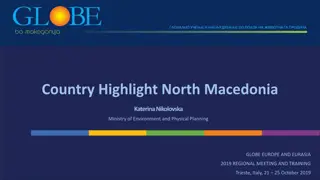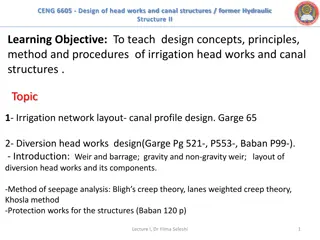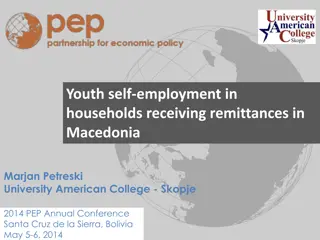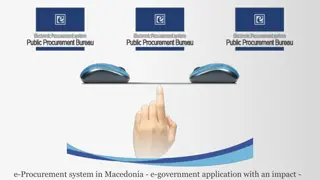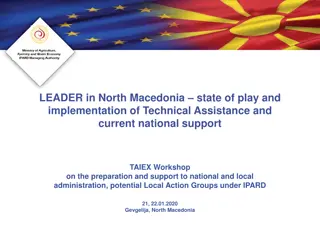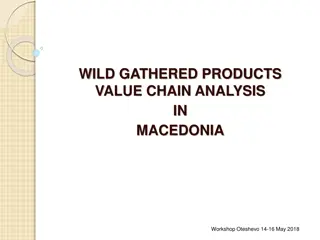Evaluation Practices in Macedonia: What Works, What Doesn't
The comparison between the effectiveness of evaluation practices and the presence of formal institutions in Macedonia raises questions about the impact of institutional design on outcomes. While some countries with robust evaluation institutions fall short in practice, others lacking such structures achieve success. The case of a Potemkin village project funded by the EU highlights how even the best evaluation practices can be deceived. The debate between balanced regional development investment and targeted regional funding adds another layer to the evaluation landscape in Macedonia.
Download Presentation

Please find below an Image/Link to download the presentation.
The content on the website is provided AS IS for your information and personal use only. It may not be sold, licensed, or shared on other websites without obtaining consent from the author. Download presentation by click this link. If you encounter any issues during the download, it is possible that the publisher has removed the file from their server.
E N D
Presentation Transcript
MACEDONIAN EVALUATION PRACTICES: WHAT WORKS, WHAT DOES NOT WORK? Subtitle 7/18/2024 1
System of institutions for evaluation vs. evaluation practices Basic assumption: If you build full-fledged system of institutions for evaluation your evalution practices and outcomes will be much better than not having such a system! RIGHT OR WRONG? Some countries have state of the art institutions for evaluation Ministry of planning, Office of Evaluation, Audit Office, Laws and Bylaws that make the evaluation process obligatory yet they not have good evaluation practices and outcomes. Others may lack institutions and still have good evaluation practices and reach better developmental goals. UK dones not have formal Constitution, however it is probably among the top countries in the world where rule of law governs and merits of constitutionalism are respected.
Institutions and practices Macedonia is not a country with the best institutional design There is no special ministry of planning, neither office of evaluation etc. There is an independent State Audit Office and is very active Scattered planning departments within the ministries, as in the Ministry of Finance. Developmental plans, Government s programe for the mandate, etc. Planning documents of the Ministry of Local self-government: Strategy for regional development, 10 year well researched and documented plan for the development of the 8 regions. Plan full of action measures and indicators to assess the realization of the developmental goals.
Potemkin village Small rural municipality in Macedonia gets a project from the Europan Union IPA cross- border instrument Bulgaria North Macedonia The project was a regional NGO House actually with the several hundred thousand euros to reconstruct an old abandoned school in the municipality. The project was well administered and selected and under scrutiny of the best EU evaluation practices. It was built and started working,. 3 years later the whistleblower from the municipality who pushed for the project initially, alarmed that it is not sustainable anymore. The NGO HOUSE IS EMPTY. The new mayor did not allow the success story from the former one. The mayor stages the Open House just for purposes of control. Brings desks, chairs, computers, people to act as NGO s employees and activists. POTEMKIN VILLAGE! YOU CAN CHEAT THE BEST ESTABLISHED INSTITUTIONS FOR EVALUATION. Follow up: CASE CLOSED: Some powerful politician stands behind the mayor!
Balanced regional development vs. investing in the region of choice Law on balanced regional development reads: 1% of GDP should go vor the balanced regional development. Out of 13 billion euros GDP, this is 130 million euros. 8 statistical regions Only 5-7 million euros are given for BRD through the programs of the MLSG. Around 20 million euros come from foreign donors. But other ministries also have regional projects. Transport, Healthcare, Socialcare, Culture, they build roads, schools, hospitals, kindergardens, so probably more than 130 million euro goes to the REGIONS OF CHOICE for the ministries, not for the BALANCED REGIONAL DEVELOPMENT. Outcome SOME REGIONS ARE LAGGING BEHIND IN DEVELOPMENT MORE THAN BEFORE! How to fix this?
SIRERA software: A tool for achieving balanced regional development Project SIRERA, MLSG with the financial help of Swiss govt. Every ministry should provide data on their projects with regional impact. Data should be used to balance the regional development. If one year we see less investments in one region, next hear the money should go there as a priority. Still things have to be done: amendments on the law and bylaws to oblige the ministries not only to give data for the projects but also to focus their future investments projects in developed regions early in the budgeting period using data from the SIRERA software. If properly done this will be a huge step forward towards BALANCED REGIONAL DEVELOPMENT.







